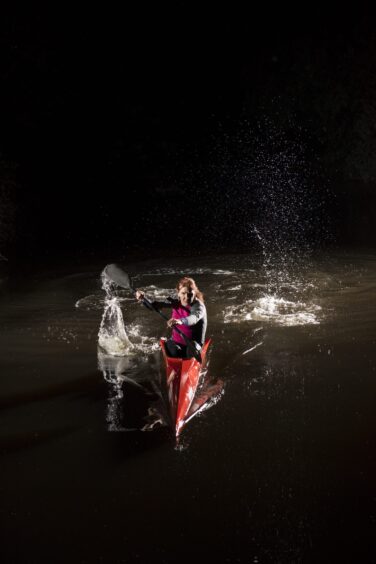
This summer saw Paris host the Summer Olympics and with that came mounting debate surrounding transgender athletes and how they compete.
One person who is all too familiar with competing at an Olympic level while contending with gender identity is Dawn Wyvern, also known as Gary Parkinson.
Wyvern worked in the North Sea for a number of years after spending time in the RAF, competing in global canoeing competitions and coaching around the world.
Looking back on her time as an athlete, Wyvern explained how she took to kayaking and later canoeing.
“When I was younger at school, I was absolutely atrocious at any ball sport,” she told Energy Voice.
“In the 1960s, most schools were similar to my school, and everything revolved around balls. We played football, we played rugby, we played cricket, and we played tennis. They were the sports available to the school.”
She explained that cross country was also an option, however, “that was about it”.
“I was the person who was put behind the goalpost to pick up the balls when people missed the goal. I was the person put out on the boundary when they were playing cricket to go and get the ball if anybody hit it that far. And for tennis, I couldn’t keep a ball inside the net.”
However, her relationship with sports changed when her school took advantage of the local landscape in Devizes, Wiltshire.
This town is the home to the “longest non-stop canoe race in the world,” Wyvern explained.
“The school didn’t have a canoe club at that time it. It started off all new, everybody was on the same skill set. Nobody had done canoeing so I leapt at the chance and said ‘yeah, I’ll have a go, what is it?’ and joined up.”
This sporting background transferred to Wyvern’s time in the RAF where she “started racing right away for the Royal Airforce team”.
“I was fifth in Great Britain at that time in canoe, but I then ended up paddling in a double with a gentleman called Ken, and he and I were second in Great Britain and we ended up racing together internationally.”
The pair were selected to compete for Team GB in two Olympics, however, it was not to be.
“I selected for the Moscow Olympics, which was an Olympics that we weren’t allowed to attend, and I was in the armed forces which was very much frowned upon.”
At the second time of asking, this time for the Olympics in Los Angeles, Dawn and Ken were also unable to compete as his services as a nurse were required to tend to casualties from the fallout of the Falklands War.
However, Wyvern did compete in the international championships and raced in Spain and Amsterdam.
The Olympics and transgender debate
She always competed as a man and when asked if she ever wanted to compete as a woman, Wyvern answered: “If I say every day, that would be an understatement.”
She added: “I’ve always wanted to be able to transfer my skills and race as a female.
“However, one interesting thing was that with the male Sprint canoe where you each paddle one side, we always trained with the women’s kayak because the speeds were very similar.”
Throughout the summer tensions flared online as misinformation was spread regarding Imane Khelif, the Algerian Olympic champion boxer, as people claimed she was transgender.
The fallout of this resulted in Khelif naming Harry Potter author JK Rowling and the owner of X (formally known as Twitter) Elon Musk in a cyberbullying lawsuit.
Speaking on media representation of transgender people, Wyvern said that certain “negative comments” can lead to “a hub of discomfort.”
She explained that anti-trans talking points put the community “on the back foot”.
“When you have populist people like JK Rowling, and now Elon Musk, vocalising against transgender and then you have the very strong women’s groups that are vocalising against transgender, we’re always on the back foot trying to defend ourselves and trying to put a good face forward and just trying to live our lives normally.
“I think that’s something that is often forgotten.”
She added that “political aspects are overriding the human aspect” when it comes to discussions around transgender people.
Trans people in sports and levelling the playing field
Wyvern shared conflicted opinions on how transgender athletes should compete.
She explained: “As I’ve been coaching and racing, I have a very different approach to many other trans people. I do totally agree that there should be the ability for trans people to compete internationally. However, I’m also extremely aware of the potential unevenness of that ability.”
She pointed to biological differences in men and women that may give one an unfair advantage when competing with the other.
“This is why it’s such a difficult subject because it is very, very sensitive. A lot of people like Sharon Davis are very vocal about trans women and men in sport and other competitors are being wrongly accused of being trans.”
She explained that it is “very difficult to even the playing fields to say that you’re going to have a totally fair competition”.
Wyvern said this is an aspect of the conversation that “will never change,” she added: “No matter how much I would love to be able to compete, I would never feel comfortable competing because I’d always feel I’d have an unfair advantage.”
Discrimination offshore
It is not just in sport that transgender people experience discrimination. The decision to share who she is with colleagues resulted in some issues during her career offshore.
“When you’re offshore, obviously it’s a very different environment. It’s just a little bit more macho,” she said.
“You don’t ask, you don’t tell and that was basically how we tended to work. Being the medic offshore, it was a little bit expected the medics were all slightly off center.”
However, when Wyvern shared that she is transgender with colleagues, her boss at the time was far from supportive.
“I never actually broadcasted that I was trans for quite a long time when I was offshore. It was only when I met a couple of people offshore we were discussing it and at that point it became known to a select few people that I was trans.
“Unfortunately, one of the managers on the platform I was on wasn’t very comfortable with having anybody who wasn’t pure red blood male and I was given a little bit of rough time and eventually I was moved off that platform.”
A new platform with new attitudes
She said that she is not a “shrinking violet” and that this experience to not deter her from expressing herself going forward.
The company Wyvern was working for at the time quickly sourced another platform for her to work on and, on this installation, the management was more understanding.
“On arrival at the second platform I was informed that it didn’t matter what I was, it was fine, and everybody was happy and I was just to get on with life and do the job.”
When the manager on this platform changed, Wyvern was sought out and asked to have a meeting with her new boss.
She recounted: “He hadn’t come across transgender before and he just called me in his office and we had a very open and frank discussion about what transgender was, how they could support me.”
Although this was a positive experience, Wyvern explained that a new boss calling her into his office made her think she was in for a slap on the wrists.
“For a new boss who was a big rugby player, beer-drinking type person, you sort of think ‘crikey, what have I done now’,” she joked.
“It quickly reverted back to being fantastic, everything was great and the relief of being accepted was phenomenal.”
Becoming ‘more relaxed’ and open
Up until this meeting Wyvern said, “I kept myself to myself”, however, following this discussion she became “a lot more relaxed”.
This freedom to be herself also benefited others on the platform as more open discussions began to take place.
“People who had children or family members who were on the LGBT spectrum were comfortable coming to chat to me about how to support them… which is I thought was really good.
“I was giving something back to the energy sector that it hadn’t really exhibited before and I think that was something very interesting.”
Wyvern now works for MCL Medics and she says the team at the firm has been exceptionally supportive of her.
Recommended for you


 © Supplied by Dawn Wyvern
© Supplied by Dawn Wyvern © Supplied by PETTER ARVIDSON/BILD
© Supplied by PETTER ARVIDSON/BILD © Supplied by Dawn Wyvern
© Supplied by Dawn Wyvern